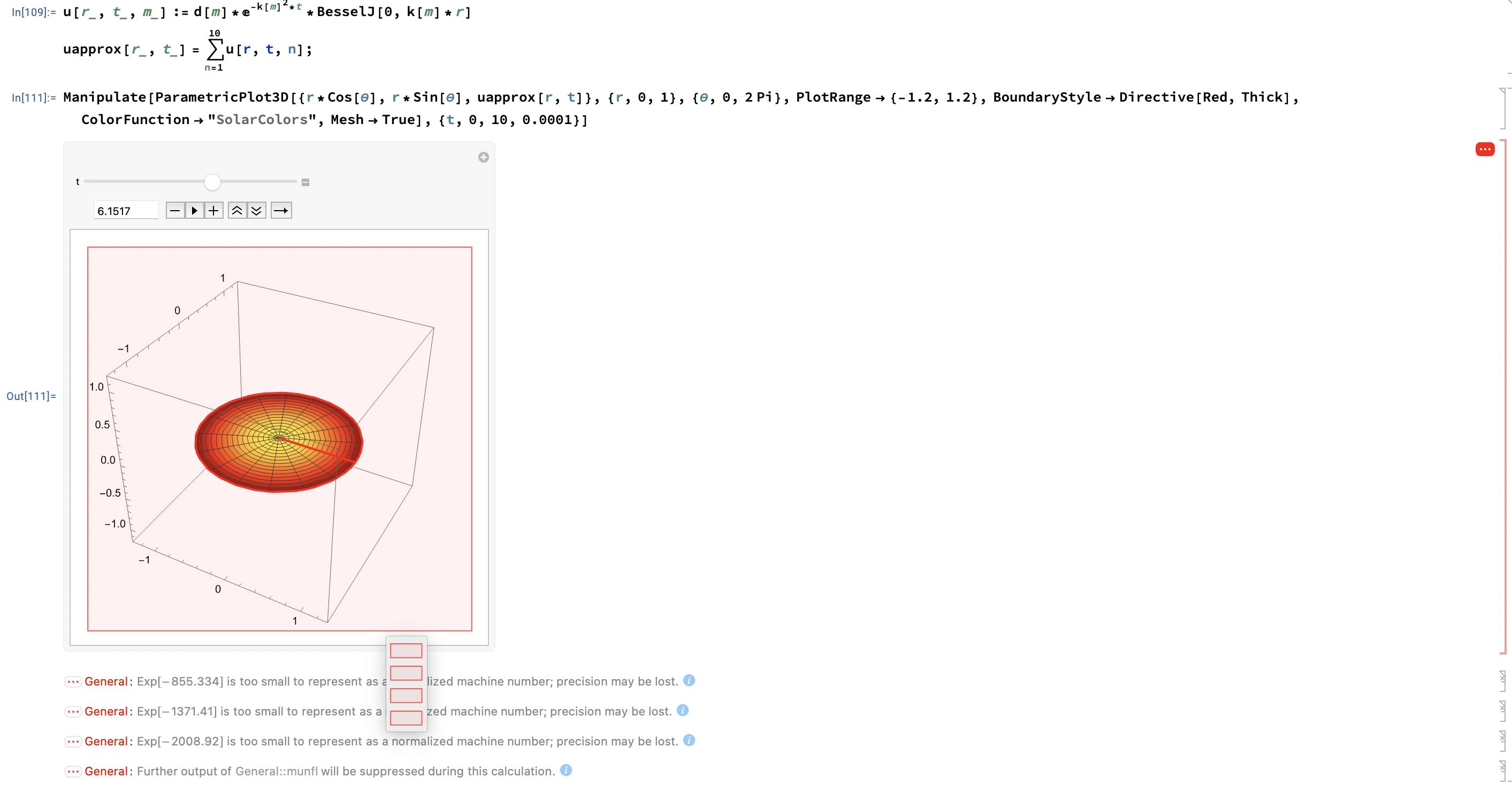As I posted in Parametric Plot 3D error in heat equation in polar coordinates They tried to explain me but I have confused worst now.
So the problem is the following
$ \begin{align} u_t&=v*(u_{rr}+r^{-1}u_r), \quad 0\leq r <a , t>0\\ u(r,0)&=f(r)\\ u(a,t)&=0 ,\quad t \geq0 \end{align}$
We know that $f(r)=J_0(x_{01}r)$, where $x_{01}$ is the first positive root of the Bessel Function and $a=v=1$
Solution
Now we solve the problem with the method separation of variables. Let $$u(r)=R(r)T(t).$$ Then, $$R(r)T'(t)=R''(r)T(t)+r^{-1} R'(r)T(t)$$ We divide both sides with $R(r)T(t)$. Thus, $$\frac{T'(t)}{T(t)}=\frac{R''(r)}{R(r)}+r^{-1}\frac{R'(r)}{R(r)}=-\lambda$$. So we have the following two equations $$r\cdot R''(r)+R'(r)+\lambda\cdot r R(r)=0, \quad 0<r<1 \tag 1$$ It is Sturm Liouville problem, from which we can conclude the weight function is $w=r$. We change variables $x=k \cdot r$ then we obtain $$x\bar{R''}+bar{R'}+x\bar{R}=0 \tag2$$. The equation $(2)$ has as solution the Bessel function $\bar{R}=J_0(x)=J_0(kr)$.
The boundary condition $u(a,t)=0, t \geq 0$ become $R(a)=0$, so $J_0(ka)=0$. That means $k \cdot a$ must be the root of the Bessel function with zero order.
$$k_m \cdot a= x_{0m}, \quad m=1,2,...$$.
Now $W'(t)+\lambda W(t)=0$ has general solution $$W(t)=c_1 e^{-\lambda \cdot t} \tag3$$ Then we have $$W(t)=c_1 e^{-k_n^2 \cdot t}$$ Now from superposition, the general solution to the problem will be $$u(r,t)=\sum_{n=1}^{\infty} d_m \cdot e^{-k_n^2 \cdot t} \cdot J_0(k_m r)$$ and the coefficient will be $$d_m=\frac{2 \int_{0}^{a} r \cdot f(r) \cdot J_0(k_m r) dr}{a^2 J_1^2(x_m )}, where \quad k_m=\frac{x_{0m}}{a}$$ Now I am trying to write the Mathematica code
a = 1;
x0[m_] := N[BesselJZero[0, m]]
(*d definition of the function f(r)*)
f[r_] := BesselJ[0, x0[1]*r]
k[m_] := x0[m]/a
(* Computation of the Fourier coefficients*)
d[m_] := (2 \!\(
\*SubsuperscriptBox[\(\[Integral]\), \(0\), \(a\)]\(r*
BesselJ[0, k[m]*r]\ *f[r] \[DifferentialD]r\)\))/(
a^2*BesselJ[1, x0[m]]^2)
(*Construction of the exact solution*)
u[r_, t_, m_] := d[m]*E^(-k[m]^2*t)*BesselJ[0, k[m]*r]
uapprox[r_, t_] = \!\(
\*UnderoverscriptBox[\(\[Sum]\), \(n = 1\), \(10\)]\(u[r, t, n]\)\);
(*Graph of the exact solution*)
Manipulate[
ParametricPlot3D[{r*Cos[\[Theta]], r*Sin[\[Theta]],
uapprox[r, t]}, {r, 0, 1}, {\[Theta], 0, 2 Pi},
PlotRange -> {-1.2, 1.2}, BoundaryStyle -> Directive[Red, Thick],
ColorFunction -> "SolarColors", Mesh -> True], {t, 0, 10, 0.0001}]
graphs =
Table[ParametricPlot3D[{r*Cos[\[Theta]], r*Sin[\[Theta]],
uapprox[r, t]}, {r, 0, 1}, {\[Theta], 0, 2 Pi},
PlotRange -> {-1.2, 1.2}, BoundaryStyle -> Directive[Red, Thick],
ColorFunction -> "SolarColors"], {t, 0, 2.5, 2.5/8}]
Animate[ParametricPlot3D[{r*Cos[\[Theta]], r*Sin[\[Theta]],
uapprox[r, t]}, {r, 0, 1}, {\[Theta], 0, 2 Pi},
PlotRange -> {-1.2, 1.2}, BoundaryStyle -> Directive[Red, Thick],
ColorFunction -> "SolarColors", Mesh -> True], {t, 0, 10, 0.0001}]
When I try to run ParametricPlot3D gives me. Could anyone explain to me, please, why I received that answer?
